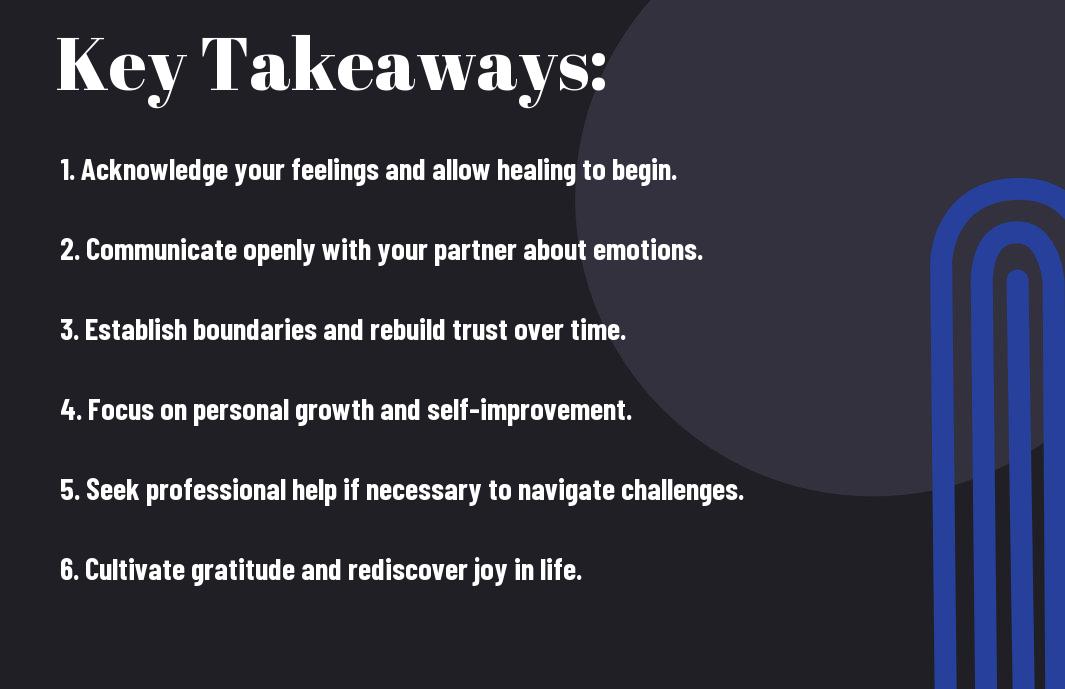With the pain of an affair lingering, you might feel like happiness is out of reach. However, reclaiming your joy is absolutely possible with the right mindset and approach. This journey requires sincere self-reflection, a commitment to healing, and a willingness to let go of the past. By focusing on your well-being and establishing new patterns, you can pave the way to a happier, more fulfilling life. In this post, you will discover actionable steps to help you move forward and embrace a brighter future.
Key Takeaways:
- Acknowledge and accept your feelings surrounding the affair, allowing yourself to grieve and process the emotions involved.
- Communicate openly with your partner about the affair, focusing on honesty and understanding to rebuild trust.
- Seek professional support, such as couples therapy or individual counseling, to aid in navigating the complex emotions and challenges.
- Establish boundaries and create a plan for moving forward together if both parties are committed to healing the relationship.
- Focus on self-care and personal growth to foster a sense of independence and regain happiness within yourself.
- Reflect on the reasons for the affair and identify changes that need to be made in the relationship to prevent future issues.
- Be patient with yourself and your partner; healing takes time, and progress may not always be linear.

Understanding the Impact of an Affair
For those affected, the aftermath of an affair can reverberate through every aspect of your life. The feelings of betrayal, guilt, and shame can lead to a complex emotional landscape that may hinder your ability to move forward. Acknowledging and processing these feelings is vital for your healing journey, allowing you to rebuild your sense of self and ultimately embrace happiness again.
Emotional Consequences
Against the backdrop of an affair, you may find yourself engulfed in a whirlwind of emotional turmoil. Feelings of anger, sadness, and confusion are common, often leading to an internal struggle as you navigate the pain of betrayal. Allowing yourself to feel and understand these emotions is imperative for your healing process, helping you to regain control over your life.
Trust and Relationship Dynamics
About the trust you once had, an affair fundamentally alters the dynamics of your relationship, making it difficult to reconnect in the same way. You may struggle with feelings of distrust towards your partner, which can create an emotional distance that complicates efforts to heal. Rebuilding trust takes time and transparency, requiring you to engage in open communication and set new boundaries.
In addition, the process of rebuilding trust involves both partners taking significant steps towards healing. You might need to discuss your feelings openly and ensure that both parties are committed to the relationship’s renewal. Creating a safe space for vulnerability can strengthen your emotional connection, allowing you to explore new dynamics while reinforcing mutual respect. It’s imperative to address how trust issues impact your relationship’s overall health, laying the groundwork for a more authentic and enduring bond.

Acknowledging Your Feelings
Some people find it challenging to acknowledge their feelings after an affair, yet this is an crucial step toward healing. Facing your emotions, whether they are anger, sadness, or confusion, allows you to understand the depth of your experience. Avoiding these feelings only prolongs the hurt and prevents you from moving forward. Embracing your emotions enables you to reclaim your happiness and start the journey toward recovery.
Recognizing Pain and Grief
Feelings of pain and grief can surface following an affair, often manifesting as deep sadness or anger. Acknowledging these emotions is a vital step in your healing process. Allow yourself the space to feel and process these emotions, as they are a natural response to loss and betrayal. Ultimately, recognizing this pain is crucial for your personal growth and understanding.
Validating Your Emotions
Behind every emotion lies a valid reason that deserves attention. You may experience a whirlwind of feelings ranging from guilt and shame to anger or betrayal after an affair. Validating your emotions allows you to accept your experience without judgment, providing the basis for healing. Recognizing the significance of what you’re feeling empowers you to understand and address your emotional responses. It’s crucial to give yourself permission to feel without masking or dismissing those emotions. In doing so, you pave the way for processing your experiences and ultimately reclaiming your happiness.
Taking Responsibility
Despite the pain and turmoil caused by an affair, it’s necessary to take responsibility for your actions. Acknowledging your role in the situation is a vital step toward healing and regaining your happiness. This process involves being honest with yourself and your partner about what happened. To find support and insight from others who have faced similar challenges, consider exploring resources like Happiness after infidelity : r/Infidelity.
Self-Reflection and Accountability
Accountability is paramount in the journey to heal from an affair. By engaging in honest self-reflection, you can identify the reasons behind your actions and the underlying issues within yourself or the relationship. This honest introspection helps in recognizing patterns or behaviors that may have contributed to the infidelity and allows you to make meaningful changes.
Communicating with Your Partner
With effective communication, you can navigate the aftermath of an affair in a constructive way. Sharing your feelings openly with your partner fosters understanding and trust, which are necessary for rebuilding the relationship. It’s important to approach conversations with empathy and honesty, ensuring that both of you can express your thoughts and emotions without judgment.
Considering the emotional weight of infidelity, you should be prepared for intense discussions. Address feelings of betrayal and vulnerability while creating a safe space for both you and your partner. Be open about the circumstances leading to the affair, and listen actively to your partner’s feelings as well. This dialogue can pave the way for healing and ideally, strengthen your relationship as both of you work towards understanding and forgiveness.

Forgiveness and Letting Go
All healing begins with forgiveness, both for yourself and others involved in the affair. Letting go of resentment allows you to release emotional burdens that weigh you down, fostering a healthier path to happiness. Embracing this process opens the door to personal growth, self-reflection, and ultimately, a life free from the shadows of past actions.
The Importance of Forgiveness
After an affair, many feel overwhelmed by negative emotions, making forgiveness crucial for moving forward. It’s not just about absolving the other person; instead, it’s about reclaiming your own peace. When you choose to forgive, you take control over your life and emotions, paving the way for a healthier mindset and renewed focus on your happiness.
Steps to Release Emotional Baggage
Forgiveness is a journey that involves letting go of the pain and anger associated with the affair. Start by acknowledging your feelings and giving yourself permission to grieve. Consider journaling to articulate your thoughts and emotions, which can help in processing your experiences. Engage in mindfulness practices, such as meditation or yoga, to center your mind and reconnect with your inner self. Finally, actively choose to focus on positive aspects of your life and set future goals to propel yourself forward.
Plus, taking small, actionable steps can significantly lighten your emotional load. When you express your feelings through journaling, it creates a safe space for understanding your inner turmoil. Practicing mindfulness not only helps release stress but also promotes self-discovery and renewal. By focusing on positive goals and cultivating new, healthy habits, you empower yourself to create a fulfilling life beyond the affair. Allowing yourself to forgive lets you cut the ties that bind you to past pain, leading you toward a brighter and more hopeful future.
Rebuilding Trust
Once again, trust is the foundation of any strong relationship, and after an affair, it takes patience and effort to rebuild it. You and your partner must commit to the process, providing each other with the reassurance and honesty needed to mend the wounds. Understand that this journey will have its ups and downs, but dedicating time to genuinely work on your relationship can foster healing and ultimately restore your connection.
Establishing Open Communication
An open line of communication is vital for rebuilding trust. You should actively listen to each other’s feelings and fears, creating a safe environment where both of you can express yourselves without judgment. Prioritize sharing your thoughts, concerns, and any lingering doubts, which will pave the way for a deeper understanding and connection.
Creating Healthy Boundaries
To foster a healthier relationship, establishing clear boundaries is important. You both must identify what is acceptable and what is not in your relationship moving forward. This may include defining personal space, social interactions, and emotional sharing. By doing so, you’re not only protecting your relationship from potential future issues but also ensuring that both of you feel respected and valued.
Creating healthy boundaries involves openly discussing your individual needs and recognizing any triggers that may derail your progress. Be specific about what behaviors may cause discomfort and agree on actions that will enhance trust. By focusing on mutual respect and understanding, you create a strong foundation that promotes a positive environment for long-term healing and growth. This way, you foster both individual well-being and the overall strength of your relationship.
Focusing on Self-Care
Many people underestimate the importance of self-care after experiencing the emotional turmoil of an affair. It is important to dedicate time and energy to nurture yourself, both mentally and physically. Establishing a self-care routine can help restore your sense of balance and empower you to regain control of your life. Embrace activities that uplift your spirit, provide relaxation, and foster personal growth, allowing yourself to heal holistically.
Prioritizing Your Well-Being
About prioritizing your well-being means recognizing the significance of caring for your physical and emotional health during this challenging time. Make a commitment to incorporating positive habits in your daily routine, such as regular exercise, eating nutritious meals, and practicing mindfulness. These actions not only enhance your mood but also strengthen your resilience, equipping you with the tools to navigate your emotions more effectively.
Reconnecting with Personal Interests
Against the backdrop of emotional stress, reconnecting with your personal interests can reignite your passions and help you rediscover your identity. Engaging in hobbies you once loved or exploring new activities can provide a much-needed sense of joy and accomplishment. Allow yourself to indulge in practices that make you feel good, whether it’s painting, hiking, or mastering a new skill. These experiences can uplift your spirit and create a positive focus away from past disappointments.
For instance, actively participating in a long-lost hobby can significantly boost your mood and self-esteem. Whether you decide to take up guitar lessons or join a local art class, immersing yourself in activities that excite you allows for a powerful distraction from negative thoughts. It’s also a chance to connect with like-minded individuals, fostering new friendships that can provide support during your healing process. By surrounding yourself with positivity, you create a pathway toward a happier and more fulfilled life.
Final Words
On the whole, moving on from an affair requires commitment to understanding, healing, and reclaiming your happiness. Acknowledge your feelings, engage in open communication, and take proactive steps toward personal growth. Surround yourself with supportive friends and examine into self-care practices that inspire positivity in your life. By focusing on your own well-being and setting healthy boundaries, you can gradually rediscover joy and build a future where trust and fulfillment thrive.
FAQ
Q: How can I begin the process of healing after discovering my partner’s affair?
A: Healing from the emotional pain caused by an affair requires time and self-compassion. Start by acknowledging your feelings and allowing yourself to grieve the loss of trust. Seeking support from friends, family, or a counselor can provide a safe space to express your emotions. Consider writing down your thoughts and feelings in a journal, as this can help you process your emotions and gain clarity on what you want moving forward.
Q: Is it possible to rebuild trust after an affair, and what steps should I take?
A: Rebuilding trust takes effort from both partners, but it is possible. Begin by having open and honest conversations about the affair. The partner who strayed should take responsibility and transparently address any questions the other partner has. Establishing new boundaries and working together to create a stronger connection can help. It often helps to consult a professional therapist who specializes in relationships to navigate this complex process effectively.
Q: What are some healthy ways to cope with the pain and betrayal I feel?
A: Coping with betrayal can be incredibly difficult, but there are healthy strategies to manage these feelings. Engage in activities that you enjoy, such as exercising, practicing mindfulness or meditation, and spending time with loved ones. It’s important to prioritize self-care, so ensure you get enough rest and nurture your physical health. Avoid isolating yourself and permit yourself to seek support from professionals or support groups.
Q: How do I know when it’s time to move on from the relationship?
A: Deciding to move on is a deeply personal choice. Evaluate the potential for reconciliation by considering whether both partners are willing to address the underlying issues and work on rebuilding the relationship. If trust cannot be reestablished, or if the hurt is too profound, it may be time to contemplate ending the relationship. Trust your instincts and consider what will ultimately make you happier in the long term.
Q: What steps can I take to reclaim my happiness after an affair?
A: Reclaiming your happiness is a journey that involves focusing on yourself. Set aside time for activities that bring you joy and foster connections with those who uplift you. Engage in personal growth through hobbies, education, or new experiences. Building a strong sense of self-worth and nurturing your interests can help you rediscover happiness. Practice gratitude by daily reflecting on positive aspects of your life, and consider setting future goals that inspire you.
